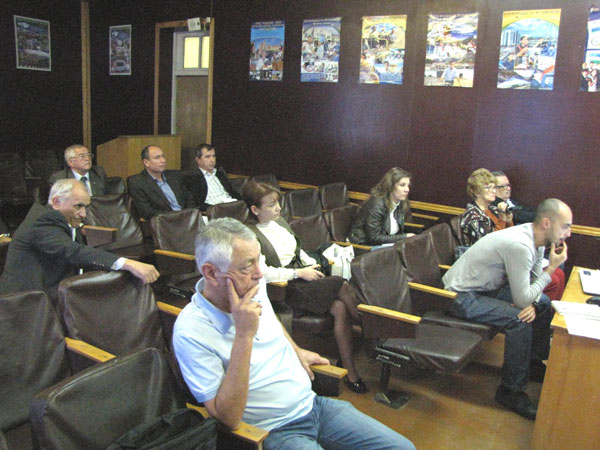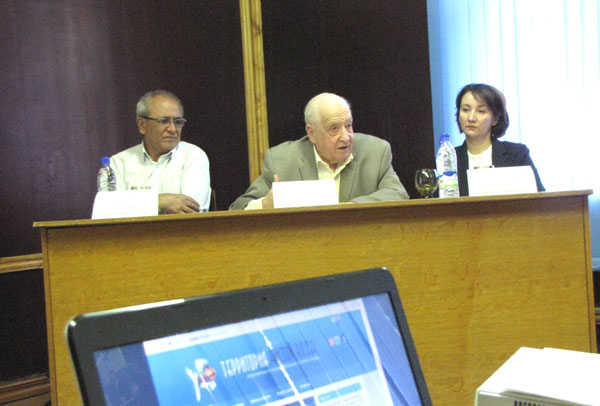SIC ICWC INITIATES A WATER SAVING CAMPAIGN
Press-conference was held on the 28th of September 2017 at the Scientific-Information Center of the Interstate Commission for Water Coordination in Central Asia (SIC ICWC) for Uzbek mass media.
The conference was aimed to enhance relationship with the media for raising awareness about water saving.

In his welcome speech, Director of SIC ICWC Prof. V.Dukhovniy stressed critical challenges facing all Central Asian countries in the context of growing water scarcity.

The observed rapid growth of population in the Aral Sea basin, growing demand for agricultural production, and Afghanistan’s intentions to increase its water diversions from the Amudarya River (from the present 2.2 km3 a year to 6 km3) under conditions of changing climate lead to lower water supplies and call for cardinal revision of approaches to water management and use.
He mentioned Israel as a positive example of sound water management under conditions of scarce water, where water saving is practiced as a well-established system with strict government control rather than as one-time effort. One major aspect of making good use of water and all-round conservation of water in Israel, along with application of advanced methods and automation of agricultural management, is education of population so that the latter respects water and values water.
In 1998, a strategy for efficient water use was elaborated together with SIC ICWC and approved in March by the Board of the International Fund for Saving the Aral Sea (IFAS). In September 1998, the Board of IFAS returned to this topic and, while taking notice of ICWC’s work for reduction of water wastage in the Aral Sea Basin, recommended intensive efforts in this direction. Unfortunately, this decision has not been fulfilled in full.
There are still problems caused by obsolete irrigation infrastructure, outdated irrigation technology and technique, poor water monitoring, etc.
Nevertheless, the Central Asian countries, particularly Uzbekistan have experience and knowledge on reduction of water wastage, optimization of water use, and improvement of water productivity. Those include agricultural diversification (re-orientation). For example, irrigated cropping patterns have changed by reducing the areas under water-intensive rice and cotton and extending the areas under fruits and grapes, wheat and other low water consuming crops. Particular attention is paid to regulatory and legal base. Incentives are provided for farmers.
Other examples are the modernization of infrastructure, institutional changes, adoption of water-conservation technologies, etc.
Prof. Dukhovniy showed as an example the positive results of the project “Integrated Water Resources Management in the Fergana Valley” implemented in Uzbekistan, Tajikistan, and Kyrgyzstan in 2001-2012 with the support of the Swiss Agency for Development and Cooperation.
However, for the desirable results to be achieved it is not sufficient to have fragmented best practices. The whole set of measures, with strict control over the use of water and its countrywide monitoring is needed. It is necessary to adopt economic mechanisms for regulation of water use and ensure water re-use. In addition, one should pay attention to implementation of up-to-date irrigation techniques, including drip irrigation, flexible hose irrigation. Undoubtedly, implementation of modern technologies and techniques is costly but this will contribute substantially to saving of water.
SIC ICWC expert N.Mirzaev in his presentation described in details the vision of main institutional aspects of water saving in Uzbekistan. He underlined that thanks to numerous projects and measures undertaken by the Government of Uzbekistan, since 1991 water diversions have been decreased (from 64 to 51 km3, and accordingly for irrigation from 59 to 43 km3), and unit irrigation water diversion has also decreased to 10,300 m3/ha on average.
It should be noted that the reduction of unit irrigation water delivery is achieved largely through re-use of return water rather than by saving water on the field. Hence, it is not the case of quantity of water delivered to the field but rather application of such approaches and tools that ensure all-round water re-use and lowering of wastage during transportation of water.
Water saving, as a rule, is induced now. Additional important incentives are needed so that water saving become voluntary, i.e. when water user chooses a water-saving approach even if water is not scarce.
One successful step towards all-round water saving is an effective system of incentives and rules that shape individual behavior causing people to do things that otherwise they will not do. One of effective measures is financial one that implies penalties or money rewards that impel to save water resources everywhere. Special attention should be paid to encouraging the staff of water operators and water user associations to ensure sound water management and give bonuses to farmers who adopt advanced irrigation methods, such as drip irrigation.
In addition to available potential, scientific knowledge and expertise in the Republic, it is very important and of priority to change minds and attitudes towards water among the general public and decision makers in order to solve existing problems and improve water governance.
Only deeper understanding of the value of water and the importance of water saving both among managers at different levels and population and the general determination and joint efforts would allow us to meet the current water-related challenges and risks.
The Scientific-Information Center of ICWC appeals to all media representatives to unite and extend their outreach activity among the general public aimed at rearing careful attitudes towards water since our futures depend on this!
|